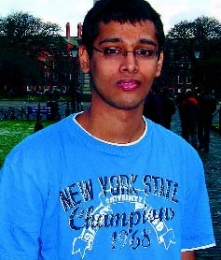Shyam S Sathyanarayana from Chennai in India has nothing bad to say about Ireland. In his eyes, the gloomy economic times have not wiped the smiles off people’s faces, and the freezing weather hasn’t broken his resolve to never wear a coat.
“I carry one,” admits a coatless Sathyanarayana, “because people ask why I’m not wearing a jacket – so I say I’m carrying one.”
An Erasmus Mundus Master’s student in Mechanical Engineering at Trinity College Dublin, the positive-thinking Indian was last week elected chairman of the university’s new Indian Society, following its launch by India’s ambassador PS Raghavan.
The aim of the society will be to promote knowledge and experience of Indian culture within the campus, provide a forum for Indian students studying at the college, and encourage young Indians back home to consider studying at Trinity College.
Some 120 members have signed up with the society already – more than half of them being students. “We are amazed,” admits Sathyan-arayana of the response. He adds that the main objective of the society will be the promotion of Trinity as a place where Indian students can come to further their education. “Trinity has everything and anything,” he remarks.
Commenting on the college’s relationship with India, TCD provost Dr John Hegarty says the university has “very strong” historic links with India.
“In recent times, Trinity has been actively engaged in developing exciting academic links with India. Students from all over India have experienced the richness of student life in Trinity and the rewards of studying in an environment of academic excellence.”
He continues: “We currently have approximately 80 Indian students within our undergraduate, postgraduate and research programmes, studying a range of disciplines across the sciences and humanities. Trinity is also actively engaged in developing strategic links with other prestigious third level institutions in India, to both further collaborative research projects and to facilitate the sharing of intellectual expertise.”
However, vast sections of Indian society remain too poor to afford a third level education for their children, and one could suggest that the Trinity Indian Society’s chief objective will be lost on far too many.
Sathyanarayana responds that for potential research students in particular, there are workable opportunities abroad – as opposed to India, where the massive population means that research grants are fiercely competed for.
“I’m here on a scholarship,” he says in reference to his own backing through Erasmus Mundas, “which is for €42,000 over two years.”
Indeed, as part of the scholarship programme, he will be relocating to Lyon, France before next August – where he likely won’t need his coat.












